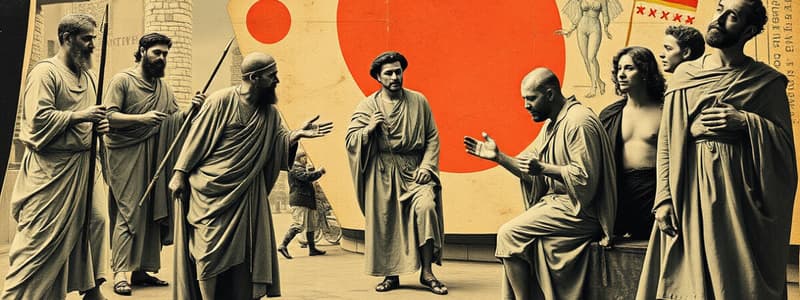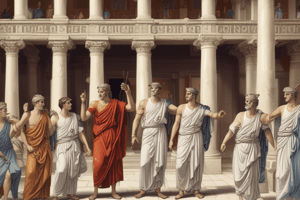Podcast
Questions and Answers
What is Middle Comedy?
What is Middle Comedy?
What is a Stock Character?
What is a Stock Character?
A stereotyped character in Roman and Greek plays such as pimps, prostitutes, slaves, young lovers, or maids/nurses.
What were ludi scaenici?
What were ludi scaenici?
Theatrical performances in ancient Rome associated with public games.
What were ludi sollemnes?
What were ludi sollemnes?
What are Ludi Romani/Ludi Magni?
What are Ludi Romani/Ludi Magni?
What were Ludi Megalenses?
What were Ludi Megalenses?
What does munera refer to in ancient Rome?
What does munera refer to in ancient Rome?
What are ludi circenses?
What are ludi circenses?
What is instauratio?
What is instauratio?
What are fabulae crepidatae?
What are fabulae crepidatae?
What are fabulae praetextae?
What are fabulae praetextae?
What are fabulae palliatae?
What are fabulae palliatae?
What are fabulae togatae?
What are fabulae togatae?
What does contamination mean in the context of Roman theater?
What does contamination mean in the context of Roman theater?
What is a tibia?
What is a tibia?
Who is an actor in ancient Rome?
Who is an actor in ancient Rome?
What does grex/greges mean?
What does grex/greges mean?
What is stoicism?
What is stoicism?
Name one work of Euripides.
Name one work of Euripides.
Name a work by Aeschylus.
Name a work by Aeschylus.
Name a play written by Sophocles.
Name a play written by Sophocles.
Name a work by Aristophanes.
Name a work by Aristophanes.
Name a play by Menander.
Name a play by Menander.
What is a notable work by Terence?
What is a notable work by Terence?
What is one of Plautus' famous works?
What is one of Plautus' famous works?
Flashcards are hidden until you start studying
Study Notes
Middle Comedy
- A transitional phase of ancient Greek comedy that followed Old Comedy and preceded New Comedy.
- Characterized by less political satire and more focus on social relationships.
Stock Character
- Stereotypical figures commonly found in Roman and Greek plays.
- Examples include pimps, prostitutes, slaves, young lovers, and maids/nurses.
Ludi scaenici
- Theatrical performances in ancient Rome associated with public games.
- Initially introduced during Ludi Romani, with the first Latin tragedies and comedies presented in 240 BC.
- Became a hallmark of the Megalensia festival, celebrating the goddess Cybele, established in 204 BC.
- Originally featured serious dramas but shifted towards farces and pantomimes under the Roman Empire.
Ludi sollemnes
- A religious festival in ancient Rome consisting of multiple ceremonies, held from September 12 to September 14.
- Extended to September 5 to September 19, with an additional day for Julius Caesar starting in 1st century BC.
- Introduced Greek drama to the Roman theatrical tradition.
Ludi Romani/Ludi Magni
- A prominent religious festival in ancient Rome that included various ceremonies known as ludi.
- Established in 366 BC, originally held from September 12 to September 14, later extended.
Ludi Megalenses
- Festival celebrated in ancient Rome from April 4 to April 10 in honor of Cybele, referred to as Magna Mater.
- The term "Megalensia" derives from the Greek word for "Great."
- Included games or entertainments associated with the religious festivities.
Munera
- Public works in ancient Rome provided by wealthy and high-status individuals for the benefit of the community.
- The term signifies a duty or obligation to contribute to society.
Ludi circenses
- Refers to "circus games" encompassing chariot races, animal hunts, gladiator games, and athletic competitions.
Instauratio
- Religious rites undertaken during festivals; includes ritual performances to correct errors in a play, requiring a restart of the performance the next day.
Fabulae Crepidatae
- Roman tragedies based on themes and stories from Greek literature.
Fabulae praetextae
- Dramas centered on Roman subjects, named for the distinct Roman garment worn by the characters.
Fabulae palliatae
- Stories performed in Greek costumes, reflecting Greek cultural influences on Roman theater.
Fabulae togatae
- Roman-themed comedies known primarily through fragments of text.
Contamination
- A literary technique where Romans translated a Greek play and integrated scenes from different Greek playwrights into the narrative.
Tibia
- A two-ended flute similar to the Greek aulos, used in ancient musical traditions.
Actor
- The producer of the play who likely commissioned the performance.
Grex/greges
- Refers to the group of actors, often led by a central actor.
Stoicism
- A philosophy promoting emotional resilience, especially concerning negative emotions.
- Seneca focused on anger as an irrational and revenge-driven response, disconnecting it from reason.
Euripides
- Notable works include Bacchae (405 BCE), Cyclops (411-405 BCE), Medea, and Iphigenia in Aulis (405 BCE).
Aeschylus
- Key works include Prometheus Bound (479-424 BCE) and Persians (472 BCE).
Sophocles
- Renowned for plays such as Ajax (440s BCE) and Trackers.
Aristophanes
- Renowned comedies include Women in Power (393-391 BCE) and Frogs (405 BCE).
Menander
- Known for the play Woman of Samos (317-307 BCE).
Terence
- Famous for Adelphoe (160 BCE), performed at the funeral of Lucius Aemilius Paullus.
Plautus
- Known for the play Rudens (190-185 BCE), integrating comedic elements into Roman theater.
Studying That Suits You
Use AI to generate personalized quizzes and flashcards to suit your learning preferences.





